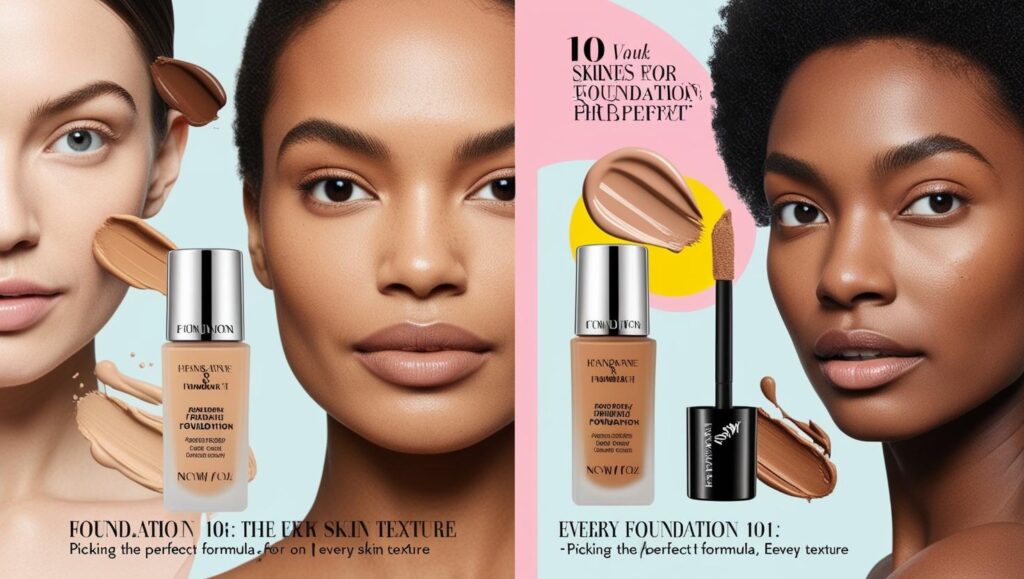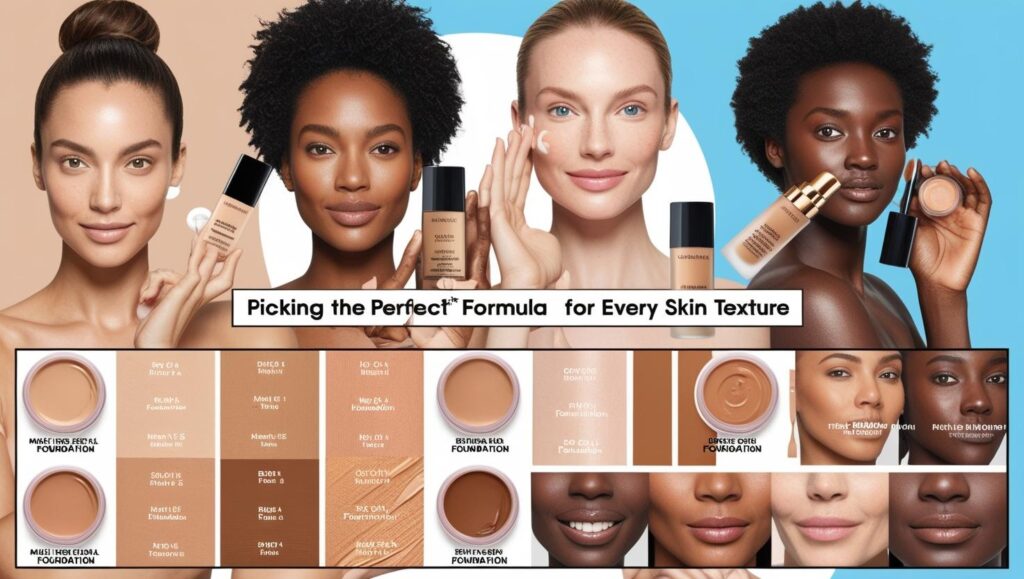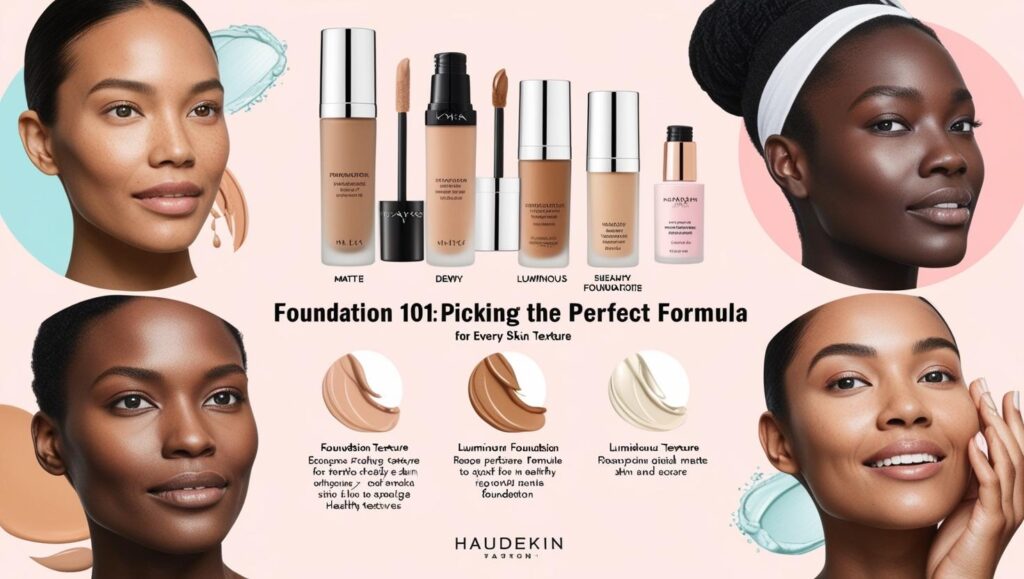Foundation is, after all, the basis of all makeup. It is that first layer, the one which lays the ground for the entire rest of the makeup, giving way to a smooth canvas to paint blush on or eyeshadow. And with so many formulas and choices available, finding the right foundation for your skin type or the skin texture of your client can be quite confusing. That is where a strong foundation of knowledge in the basics is applied. Whether you are a makeup aficionado or a person looking to make a hobby a career, perfecting the application of foundation is the most important thing.
In this blog post, we will break down the basics of choosing the right foundation for every skin texture, while also introducing the Fundamentals of Makeup & Hair Trends Certification—a course designed to help you navigate the world of foundation and makeup like a pro.
Understanding Different Skin Types and Textures
Now, before you are thinking of picking a foundation, it is an important awareness whether you have a specific skin type or your client has one. Actually, the skin texture can vary broadly, starting from oily to dry and even sensitive or combination. Each kind of it requires special needs, so picking the wrong foundation formula leads to makeup mishaps.

Here’s a quick guide to different skin types and how they affect foundation selection:
If your skin is very oily, find a foundation which will control the shine and give it a matte look. Look for oil-free long-lasting foundations that won’t clog pores but control shine and ensure a good flow of coverage at the same time.
Dry skin: Hydrating foundations are a must for dry skin. Cream or liquid foundations with moisturizing ingredients such as hyaluronic acid will help keep your skin looking smooth and dewy. Avoid matte formulas because they can make dry skin look even drier.
Combination Skin: A combination of both oily and dry areas, so you should look for a foundation that can balance it. A good option for individuals with combination skin would be a semi-matte because it helps keep the shine under control without pushing through the dry patches.
Sensitive skin: Very delicate skin, especially around the eyes, calls for special attention to foundation choice. Look for fragrance-free, non-comedogenic, and harsh chemical-free formulas. Mineral foundations are very often a great fit for sensitive skin, as they are known to be very gentle and soothing.
Normal Skin: You’re in luck if your skin is normal. Neither too oily nor dry, most foundations will work well for you. If you want a natural, fresh finish, look for lightweight foundations that provide medium coverage.
Choosing the Right Formula for Your Client
If you are a makeup artist or if you’re someone who intends to work with various clients, it is very important to understand how to select the right foundation formula. This can be critical since each client will have their skin type and preferences. It’s here that the Fundamentals of Makeup & Hair Trends Certification comes in handy.

How the Fundamentals of Makeup & Hair Trends Certification Helps
The Fundamentals of Makeup & Hair Trends is a course set up for learners who want more insight into various makeup techniques and the different kinds of skin so that they might learn how to apply the proper foundation for very different clients. This course not only teaches how to choose the right foundation formula but also equips you with a deeper understanding so that you would know what suits your client differently and deliver perfect, flawless finishes.
1.Understanding Skin Types
One of the first things the course teaches is how to identify different skin types and textures. Whether you’re working with a client who has acne-prone skin, dry patches, or a combination of both, the course covers it all. You’ll learn how to tailor your foundation choice to each skin type, ensuring that your client’s skin is prepped and ready for a perfect application.
2.Application Techniques
Choosing the right foundation is one thing, but applying it properly is another. The certification course dives deep into different application techniques, such as using brushes, sponges, or fingers, and how to layer foundation for the most natural finish. You’ll also get tips on how to set foundation so it lasts all day.
3.Product Recommendations
The course goes beyond theory and provides real product recommendations based on various skin types. Whether it’s full-coverage or sheer, matte or dewy, you’ll be guided through which products work best for different clients and occasions.
4.Customization for Every Client
All of the clients will have different tastes when it comes to their foundation. Some people like it lightweight, while others may want a full coverage type. The course teaches you to meet each and every client’s needs, including having a foundation color that matches your skin tone as well as matching the finish or coverage they might be looking for.
Tips to Select the Perfect Foundation Formula:
Where else would you practice becoming a master of foundations as this course lets you have ALL the tools but here are just a few very quick tips regarding choosing a formula for any particular skin type-
Test Shades
Always test the shades of a foundation in actual natural light-the best match-the foundation should ideally blend into skin without leaving noticeable line along your jawline.
Prep the Skin: Moisturize and prime the skin before applying foundation. This will help the foundation apply more smoothly and stay in place longer.
Know Your Client’s Preferences: Don’t forget to ask your clients what type of coverage and finish they prefer. Some might like a full coverage foundation, while others may want something light and breathable.
Consider the Weather: Weather can affect how foundation wears. On hot days, opt for long-wear formulas that control oil and sweat. In colder weather, choose foundations with moisturizing properties to prevent dryness.

Conclusion
There is no reason why you have to make foundation selection daunting with every type of skin texture. Knowing the various formulas that exist and the nature of your own or your client’s skin allows for an educated choice that would guarantee a perfect-looking complexion.
The Fundamentals of Makeup & Hair Trends Certification course is the right fit for you if you are interested in learning the finer points and upgrading your skills as a makeup artist. This not only assists you in the right selection of the foundation formula but also educates you about its proper application to make sure that your client always looks her best.
So, are you ready to master the art of foundation? The journey starts here!


